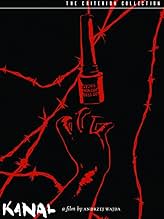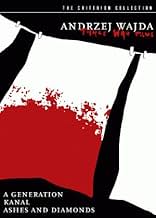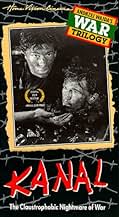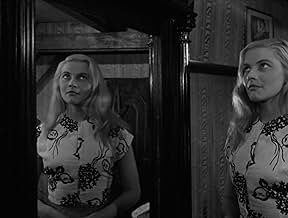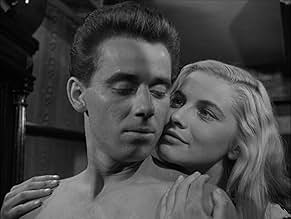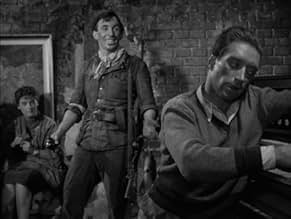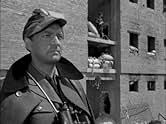IMDb RATING
7.9/10
8.5K
YOUR RATING
In 1944, during the Warsaw uprising against the Nazis, Polish Lieutenant Zadra and his resistance fighters use Warsaw's sewer system to escape the German encirclement.In 1944, during the Warsaw uprising against the Nazis, Polish Lieutenant Zadra and his resistance fighters use Warsaw's sewer system to escape the German encirclement.In 1944, during the Warsaw uprising against the Nazis, Polish Lieutenant Zadra and his resistance fighters use Warsaw's sewer system to escape the German encirclement.
- Nominated for 1 BAFTA Award
- 1 win & 2 nominations total
Vladek Sheybal
- Composer Michal
- (as Wladyslaw Sheybal)
Wlodzimierz Bednarski
- Insurgent
- (uncredited)
Zenon Dadajewski
- Insurgent
- (uncredited)
Featured reviews
10info-399
A great film, at first viewing people may not understand some of the cultural references. The tall blonde brave sewer-runner is not a model of Aryan Uber Womanhood but that of a strong polish woman.According to the official line of Nazi Propaganda the metaphor for the Aryan woman was of a breeder , home maker not a woman that would take a pro-active role in dragging aman half way across the canals of Warsaw. I saw the movie as less of a metaphor for hell as that of an actual hell,the hell of siege such as stalingrad. Stalingrad was not a metaphor for hell it was hell on earth. As was Warsaw in the last days of organized rebellion.As much as Das Boot style brought across a sliver of the real life incident , Kanal's style brings across the desperation of the struggle in Warsaw. The optomistic saddness can be written off as slavic melancholy, or better described as the hope and sorrow of a nation that has many times been routed from the map of europe only to resurface strong and proud.Everything was taken from them and hope itself is in question as the final reel fades to black.
Watching Andrzei Wajda's war movie 'Kanal' one is stuck just by how short the interval was between the making of this film and the horrors it depicts. And while there were plenty of British and American war films made in the 1950s, it was perhaps easier to turn "our" story into the black-and-white banality of heroic fable, besides which, "we" could also make movies without communist censors looking over our shoulders. Wajda here chooses to fashion a tale centred on the collapse of the Polish resistance to the Nazis: the last survivors take to the sewers, the Germans pump gas down, and you know as soon as the film starts that there will be no happy endings, even for the survivors. It's a tale whose laconic nihilism would be remarkable in any era: I was reminded of the (much later) BBC nuclear-themed drama 'Threads', another tale of underground life facing extinction, while the dialogue, stoical in the face of impossible fate, offers more direct echos, for it made me think of the films of another Polish master, Krystoff Kieslowski. The most remarkable things in this film are the poetically bleak sequence of scenes that end it; it's biggest failing is the score, that (as with many films of this era) feels the need to describe the plot, and not merely to complement it. Occasionally other aspects of the movie also give away its age, but what's much more notable is the modernity (and hopelessness) of its approach to its material. A fine achievement, dating from an era when the events it portrayed were the present, not the past.
10begger
In many respects this movie is sheer brilliance. For starters "Kanal" describes the entire Polish Revolt in a single instance at the eve of its termination. But this movie is much more than a parable of Revolution and struggle. "Kanal" has great characters, great settings, great scenes, and, above all, an important message to be told.
What would it be like to fight an impossible battle against a larger force and be in the real world? What would it be like to face death at every turn and still travel on knowing defeat awaited you at the next bend? "Kanal" is the answer to these questions.
What would it be like to fight an impossible battle against a larger force and be in the real world? What would it be like to face death at every turn and still travel on knowing defeat awaited you at the next bend? "Kanal" is the answer to these questions.
10tutusaad
I saw this film in a film festival in Dhaka, in early sixties(Now Bangladesh, then East Pakistan). For me as a student, Sattayjit Ray's Apu trilogy was my only exposer to any kind of art film then. Visual realism was a new thing for us in Indian sub continent. Audience were so spellbound that they could smell sewage sitting in the cinema hall. I think like all great directors, Wajda had the cinematographic sense to create that environment where viewers reality could blend with creative fiction. In post war period of late forties and in early fifties like the School of Polish Posters, all creative mediums went through this fatalistic phase. It was grotesque but realistic.
This is an excellent movie. It tells the story of the last stages of the Warsaw Uprising against the Nazis. A small unit of Polish Resistance fighters are ordered to fall back to a central position by going through the sewers.
Most of the actions happens in the eerie confines of the sewers, which creates a very gripping atmosphere. However, the most interesting aspect of the movie is the character development. All of the characters are so different and changeable. No stereotypical characters in this movie!
Andrzej Wajda is a truly great director. He is able to make unique movies based on the character development, rather than relying on gimmicks to gain the audience's attention. In this movie you never know what is ultimately going to happen to the resistance fighters until the final scenes.
Most of the actions happens in the eerie confines of the sewers, which creates a very gripping atmosphere. However, the most interesting aspect of the movie is the character development. All of the characters are so different and changeable. No stereotypical characters in this movie!
Andrzej Wajda is a truly great director. He is able to make unique movies based on the character development, rather than relying on gimmicks to gain the audience's attention. In this movie you never know what is ultimately going to happen to the resistance fighters until the final scenes.
Did you know
- TriviaDirector Andrzej Wajda was himself a fighter in the Polish resistance movement against the Nazis in World War II and several scenes in the film were based on his experiences.
- GoofsWhen Korab is attacking Goliath self-propelled tracked mine, a wire pulling it can be seen.
- Quotes
Narrator: These are the tragic heroes: watch them closely in the remaining hours of their lives.
- ConnectionsFeatured in Vieras (1984)
- How long is Kanal?Powered by Alexa
Details
- Runtime
- 1h 31m(91 min)
- Color
- Sound mix
- Aspect ratio
- 1.37 : 1
Contribute to this page
Suggest an edit or add missing content

